Here are a few more images captured last week in Bogota and shared with me:
Photos by Luz Coy; artists — with the exception of Toxicómano — to be identified.
When I first discovered the walls in Bogota, Colombia in 2007, I instantly fell in love with their distinct beauty, restless energy and cast of characters. Here are a few images that were captured last week and shared with me.
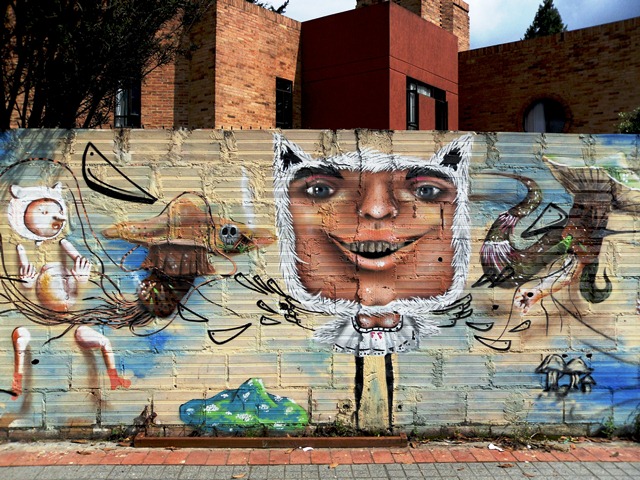
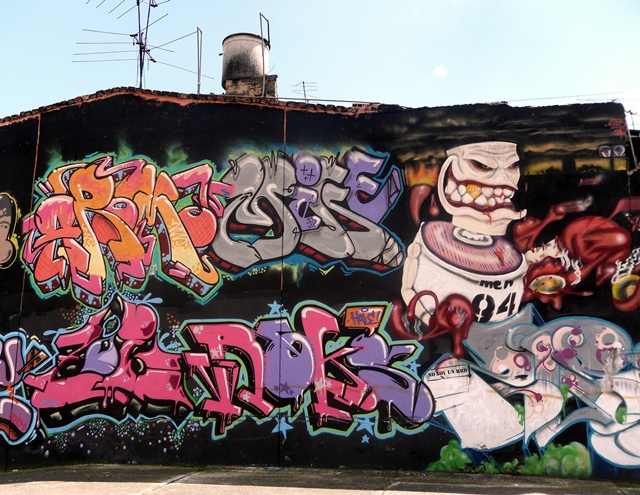
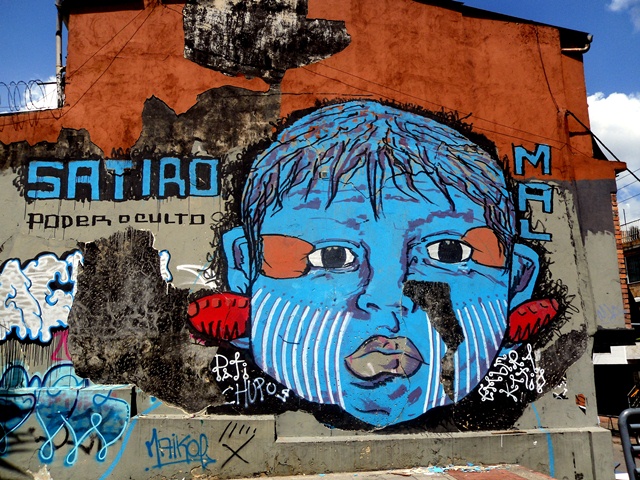

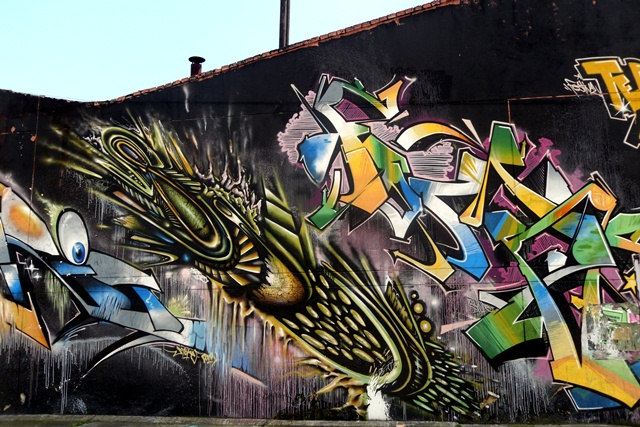
Special thanks to Luz Coy for taking and sharing these photos. Artists to be identified.
Like Mundano’s characters, Cranio’s impish — mostly blue — Indians seem to surface unexpectedly throughout São Paulo. Here are a few we encountered:
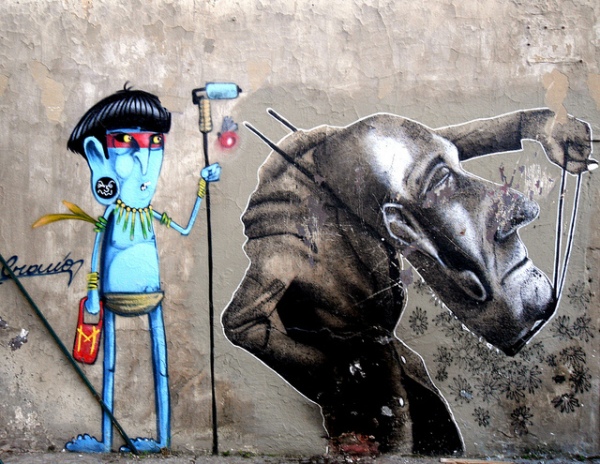
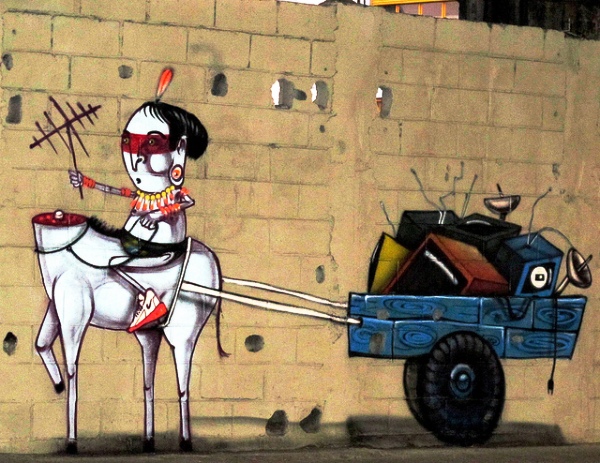
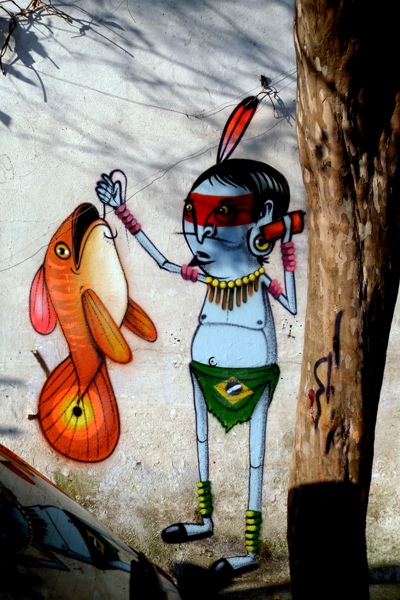
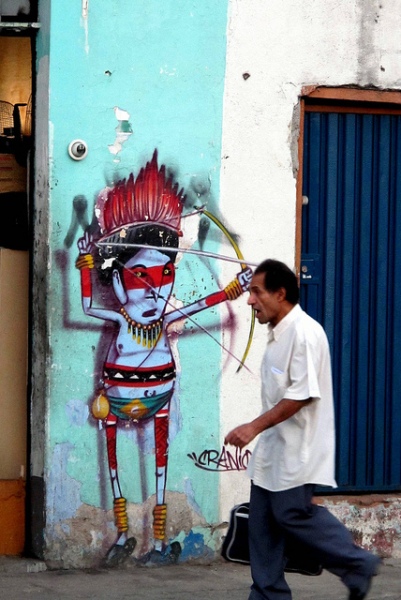
Located in the Vila Madalena district of São Paulo, Beco do Batman is a narrow alleyway that’s evolved into an open-air gallery. I discovered it last summer on my first visit to Sao Paulo. When I returned earlier this month, I revisited some of my favorite pieces, but many new ones had surfaced. Here’s a sampling:
Photos by Sara Mozeson; artwork by various artists to be identified
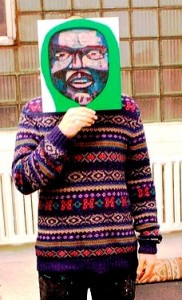 Legendary in his native Chile and throughout South America, Cekis is currently based in Brooklyn, New York. Working primarily as a muralist here in the U.S., Cekis’s artwork has also appeared in a number of galleries including the Carmichael Gallery, the Brooklyn Rotunda, Ad Hoc, and the Abrons Arts Center. As a member of the YMI Crew, working primarily with Cern, he has created large works in the streets of Bushwick and Washington Heights. While visiting his studio earlier in the week, I had the opportunity to ask him a few questions. – Lois Stavsky
Legendary in his native Chile and throughout South America, Cekis is currently based in Brooklyn, New York. Working primarily as a muralist here in the U.S., Cekis’s artwork has also appeared in a number of galleries including the Carmichael Gallery, the Brooklyn Rotunda, Ad Hoc, and the Abrons Arts Center. As a member of the YMI Crew, working primarily with Cern, he has created large works in the streets of Bushwick and Washington Heights. While visiting his studio earlier in the week, I had the opportunity to ask him a few questions. – Lois Stavsky
When did you first get your work up public spaces? I was 17 when I first started painting on the streets of Santiago, Chile.
What was your inspiration at the time? I fell in love with graffiti when I saw the movie “Beat Street.” I was also influenced by the political graffiti I saw in my city. Then in 1993, a group of us started painting on the walls in Chile.
What was it like back then? There were risks. My country was in a transitional period. We were still reeling from Pinochet’s brutal dictatorship. We had to begin painting way past midnight. We’d start at 2 or 3 in the morning. We all spent some time in jail for what we were doing.
How did your parents feel about what you were doing? My parents are traditional. They didn’t really understand what I was doing. It was not easy gaining their acceptance.
Have you gained it? Yes, when they saw the respect I was getting as a muralist, they were better able to come to terms with my decision to be a full-time artist.
I know that you’ve painted with Os Gemeos back in Chile. Who are some of the other artists you’ve collaborated with outside of the US? Among those I’ve painted with are: Loomit, Lazoo, Vitche, Stohead, Herbert Baglione, Doze Green and Cycle.
What are some of the crews you’ve represented? DVE, ADEP, VLOK and YMI
Any favorite artists? Many, many. Among them: Aislap, Grin, Phil Frost, Kara Walker, Keith Haring, Lee Quiñones, Nick Cave, Nema TPG, Os Gemeos, Jr., Sure (RIP), Nunca, Diego Rivera, Martha Cooper, Dondi, Mode 2…
That’s quite a diverse group! These days you work mainly in your studio, and your work has appeared in galleries. But you still keep on working on the streets. Is that your preferred canvas? I love the way street art engages so many people. And I love interacting with the public. When I paint in my studio, I prefer wood to canvas because it feels more like I’m painting on a wall.
What do you think of the street art scene here in NYC – principally in Brooklyn these days? I like when artists use the streets to communicate and share their talents with passersby. I dislike when folks use the streets to further their own careers. Not all kinds of art belong or work in the street, and some artists use the streets as a means to access galleries. That’s not what street art’s about.
What about the street art scene in Chile these days? How is it different from what’s happening here? In Chile and throughout Latin America there’s more freedom to paint on the streets because most people don’t see it as a criminal activity. The South American writers lack the access to the kinds of art supplies that we have here in the U.S, so they’ve become more inventive – both in their process and, as a result, in their styles. Also, because the police generally don’t harass street artists in South America, they have more time and more space for experimentation.
Any other differences? The folks there tend to value us far more than they do here. They appreciate what we are doing. They often react strongly to what we are painting on the walls, and they love to watch us while we’re painting. They’re always offering and bringing us food and drinks.
I’ve sensed that in my visits there. I only hope it stays that way! What are you working on these days? I’m currently working on a series of paintings on the theme of immigration in preparation for my first solo show sometime later this year. I’m also in the process of working on a proposal for a public mural on an extended thoroughfare in southwest Brooklyn.
Good luck! I’m looking forward to all your ventures!
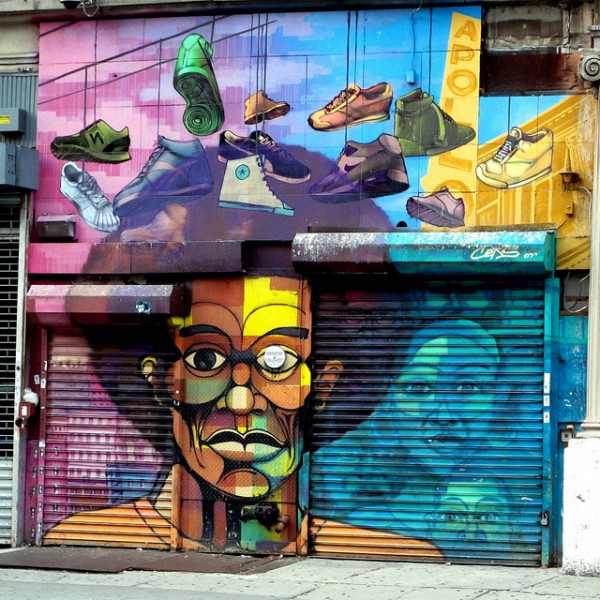
Photos and interview by Lois Stavsky